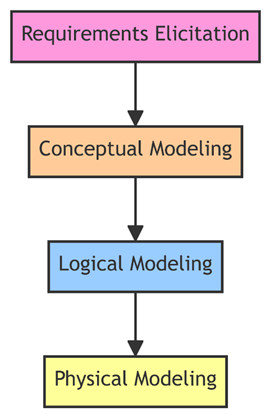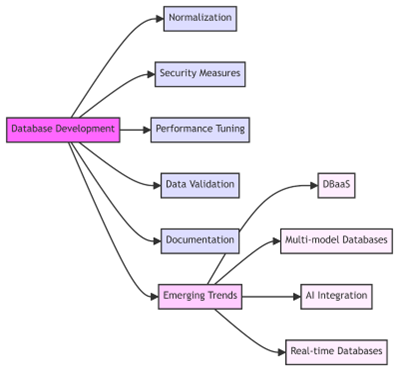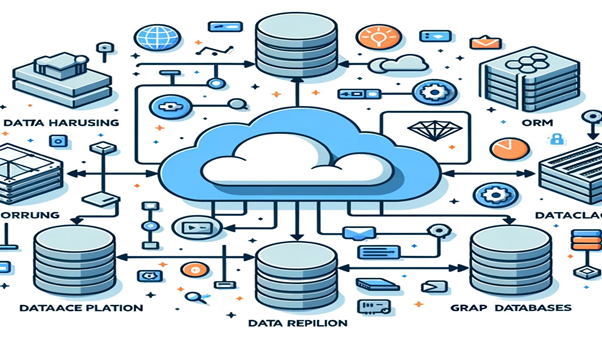Hey there, awesome visitor! 👋 Our website is currently undergoing some nifty upgrades to serve you even better. But don't worry, we'll be back before you can say "SearchMyExpert rocks!"

Database development stands as a cornerstone in the IT domain, paving the way for streamlined business operations and efficient data management. Diving deeper into this subject, we aim to provide a thorough understanding of the intricacies involved and the immense value it adds to businesses.
Understanding Database Development
Database Development is a meticulous process where raw data is transformed into meaningful insights that drive business decisions. The primary aim is to design a robust system that caters to the unique needs of a company while ensuring the safety and integrity of its data. This involves not just storing information but doing so in an organized manner that allows for efficient retrieval and analysis.
What Comprises a Database?
At its core, a database is a structured set of data stored electronically. The structure is essential to ensure data can be accessed, managed, and updated efficiently. Databases are foundational to many applications we use daily, from banking systems to e-commerce websites.
The Four Pillars of Database Development
- Requirements Elicitation: This initial phase involves understanding the specific needs and objectives of the business. It sets the stage for the subsequent steps by outlining the primary goals of the database.
- Conceptual Modeling: Here, the broad requirements are translated into a high-level data model. This model provides a visual representation of the data and its interrelationships.
- Logical Modeling: This stage dives deeper, defining the specific structure of the database, including tables, fields, and relationships.
- Physical Modeling: The final step is where the actual database is constructed. It involves defining the storage mechanism, optimizing performance, and ensuring data integrity.
Significance of Database Management
As businesses grow, so does the volume of their data. Without proper management, this can lead to inefficiencies, data loss, and missed opportunities. An effective database system not only stores and organizes data but also ensures its accuracy and reliability.
The Evolution of Database Technologies
In the ever-evolving realm of IT, various database technologies have emerged to cater to diverse needs. Some noteworthy ones include:
- Relational Databases like Oracle, MySQL, and PostgreSQL.
- NoSQL Databases such as MongoDB and Cassandra.
- Time-Series Databases like InfluxDB.
- Graph Databases such as Neo4j.
Each type serves a distinct purpose and is suited to specific use-cases, from handling large-scale e-commerce transactions to analyzing intricate networks of data relationships.
Leveraging Database Development for Business Growth
Databases are more than just storage solutions; they're powerful tools that drive business growth. Here's how:
- Efficient Data Retrieval: With a well-designed database, data retrieval is swift, ensuring timely decision-making.
- Scalability: Modern databases are built to scale, accommodating the growing data needs of businesses.
- Data Integrity: A robust database system ensures the accuracy and consistency of data, reducing errors and inefficiencies.
- Enhanced Security: Protecting sensitive business data is paramount, and modern databases come equipped with advanced security features to prevent unauthorized access.
Outsourcing Database Development: A Strategic Move
Choosing to outsource your database development can provide numerous benefits:
- Expertise: Access to professionals with deep domain knowledge.
- Cost-Effective: Often more affordable than building an in-house team.
- Custom Solutions: Tailored database solutions that cater to your unique business needs.
- Ongoing Support: Beyond development, many providers offer maintenance and support services.

Database Development Best Practices
Adhering to best practices in database development ensures not only the optimal performance of the database but also its security, reliability, and scalability. Let's delve deeper into these practices that every organization should adopt.
Normalization
Normalization is a method of organizing data in a database to reduce redundancy and improve data integrity. By ensuring that data is stored logically, normalization minimizes the chances of data anomalies.
Consistent Backups
Regular backups are crucial for data recovery in case of unexpected failures. Automated backup systems can ensure that data is consistently backed up without manual intervention.
Implementing Security Measures
With increasing cyber threats, it's essential to enforce stringent security measures. This includes encryption of data, regular security audits, and using secure protocols.
Performance Tuning
Databases should be regularly monitored for performance. This involves optimizing queries, indexing appropriately, and ensuring that the hardware is capable of handling the database's demands.
Data Validation
Ensuring that the data entering the database is accurate and valid is crucial. Implementing strict validation checks can prevent erroneous data from corrupting the database.
Documentation
Maintaining comprehensive documentation provides a clear understanding of the database structure, relationships, and functionality. This is especially vital when onboarding new team members or transitioning projects.
Emerging Trends in Database Development
The world of database development is not static. As businesses evolve and technology progresses, new trends emerge, reshaping the way we think about and interact with databases.
Database as a Service (DBaaS)
Cloud computing has given rise to DBaaS, where database services are provided over the cloud. This eliminates the need for organizations to maintain physical hardware, offering scalability and flexibility.
Multi-model Databases
These databases can store, retrieve, and manage data in multiple formats. They combine the capabilities of various database types, allowing for more versatile data handling.
Artificial Intelligence and Databases
Integrating AI with databases allows for smarter data analysis, predictive modeling, and automation of routine tasks, leading to more informed business decisions.
Real-time Databases
With the increasing need for real-time data processing, especially in sectors like finance and e-commerce, databases that can process and analyze data in real-time are becoming more prevalent.
The Future of Database Development
The future holds immense possibilities. With the advent of quantum computing, we might soon witness databases that can process vast amounts of data at speeds previously deemed impossible. Additionally, the integration of IoT devices will lead to more connected databases, paving the way for a more interconnected world.
Database development is an ever-evolving field, with its significance only set to grow in the coming years. By staying abreast of best practices and emerging trends, businesses can harness the full potential of their databases, driving growth and innovation.

The Role of Database Developers
Database developers play an indispensable role in the entire database development process. These professionals possess a deep understanding of both the technical and business aspects of a database, ensuring that it is not only robust but also aligns with the company's objectives.
Responsibilities of a Database Developer:
- Design: Creating a blueprint of the database structure, which involves defining tables, relationships, keys, and indexes.
- Development: Writing complex SQL queries, stored procedures, functions, and triggers to facilitate data retrieval, insertion, and modification.
- Optimization: Regularly monitoring the database's performance and making necessary adjustments to enhance its efficiency.
- Collaboration: Working closely with other IT professionals, such as software developers and system administrators, to ensure the seamless integration of the database with other systems.
- Maintenance: Regularly updating the database system, applying patches, and ensuring that the data remains consistent and secure.
- Documentation: Keeping detailed records of all database schemas, structures, and procedures to assist future development and troubleshooting.
The Evolution of Database Tools
With the complexities involved in database development, various tools have been designed to simplify and enhance the process. These tools not only assist developers in their tasks but also ensure the database's reliability and efficiency.
Noteworthy Database Tools:
- SQL Server Management Studio (SSMS): A comprehensive tool for managing, configuring, and administering SQL Server instances.
- Oracle SQL Developer: A free, integrated development environment that simplifies the management of Oracle Database.
- phpMyAdmin: A popular open-source tool written in PHP, designed to handle the administration of MySQL over the Web.
- DataGrip: A database IDE from JetBrains that offers support for multiple databases and boasts intelligent query console and schema navigation features.
Integration with Modern Technologies
Databases no longer operate in isolation. Modern-day applications require seamless integration between databases and other technologies:
- Cloud Integration: Many businesses are transitioning to cloud-based databases, leveraging platforms like Amazon RDS, Google Cloud SQL, and Microsoft Azure SQL Database. These offer scalability, flexibility, and cost savings.
- Big Data & Analytics: Tools like Hadoop and Spark are integrated with traditional databases to handle and analyze vast amounts of unstructured data.
- IoT Integration: With the proliferation of smart devices, databases are now integrated to store and process real-time data generated by these devices.
Ethical Considerations in Database Development
As databases store vast amounts of data, often personal and sensitive, ethical considerations become paramount. Here are some guiding principles:
- Data Privacy: It's essential to ensure that personal data stored is protected and only accessed by authorized personnel.
- Transparency: Stakeholders, especially end-users, should be informed about what data is being collected and how it's used.
- Integrity: Data should be accurate, and any modification should be well-documented and justified.
- Regulatory Compliance: Databases should comply with laws and regulations, like the General Data Protection Regulation (GDPR) and the California Consumer Privacy Act (CCPA).
Advanced Concepts in Database Development
Database development, while rooted in foundational principles, continues to evolve with advancements in technology and changing business requirements. Delving deeper, let's explore some advanced concepts that are shaping the future of databases.
Data Warehousing
A data warehouse is a specialized type of database optimized for the analysis and reporting of large volumes of data. It centralizes data from different sources, making it accessible for business intelligence activities.
Key Components:
- Fact Tables: Central tables in a data warehouse schema that contain quantitative data for analysis.
- Dimension Tables: Tables that provide context to the data in fact tables, such as time, product, or location details.
- ETL Processes: Extract, Transform, Load (ETL) processes are responsible for pulling data from source systems, transforming it into a consistent format, and loading it into the data warehouse.
Database Replication
Database replication involves creating and maintaining multiple copies of a database. The primary goal is to ensure data availability and balance the load of data requests among several servers, leading to optimized performance.
Advantages:
- Redundancy: Provides a backup in case of system failures.
- Load Distribution: Distributes query loads, improving performance and user experience.
- Data Accessibility: Ensures data is available close to its end-users, especially in geographically dispersed systems.
Object-Relational Mapping (ORM)
ORM is a technique that lets developers interact with databases using object-oriented programming languages. It abstracts and converts data between the database and the object-oriented programming language, eliminating the need for SQL code.
Benefits:
- Code Simplification: Reduces the amount of code required to perform CRUD (Create, Read, Update, Delete) operations.
- Database Abstraction: Allows developers to switch between different database systems with minimal code changes.
- Improved Productivity: Developers can focus on business logic rather than database specifics.
Graph Databases
Unlike relational databases that store data in tables, graph databases use nodes, edges, and properties to represent and store data. They are particularly useful for handling interconnected data, making them ideal for applications like social networks or recommendation engines.
Unique Features:
- Relationship Handling: Efficiently manages complex relationships between data points.
- Flexibility: Easily adapts to changing data structures without extensive modifications.
- Intuitive Modeling: Represents real-world situations and relationships more naturally.
Database Development: Looking Ahead

The landscape of database development is constantly shifting, with emerging technologies like Quantum Databases and Augmented Reality (AR) databases on the horizon. These advancements promise to revolutionize the way we store, process, and interact with data.
Furthermore, with the increasing importance of data privacy and ethical considerations, future databases will need to incorporate advanced security and compliance measures. This would involve using techniques like homomorphic encryption, which allows data to be processed without being decrypted, ensuring utmost data security.
In essence, as the world becomes more data-centric, the role of databases becomes ever more crucial. Continuous innovation and adaptation in database development methodologies will be key to meeting the ever-evolving demands of businesses and end-users.
Redefine Your Tech Journey! Explore the leading
Software Development Companies now.
Other Related Blogs


Mastering Docker for App Development: A Comprehensive Guide to Benefits, Use-Cases, and Alternatives

STAY UP TO DATE
GET PATH'S LATEST
Receive bi-weekly updates from the SME, and get a heads up on upcoming events.
Contact Us
We will get back to you as soon as possible.
Please try again later.


Find The Right Agencies
SearchMyExpert is a B2B Marketplace for finding agencies. We help you to describe your needs, meet verified agencies, and hire the best one.
Get In Touch
WZ-113, 1st Floor, Opp. Metro Pillar No- 483, Subhash Nagar - New Delhi 110018
About Us
For Agencies
Benefits Of Listing With Us
Submit An Agency
Agency Selection Criteria
Sponsorship
For Businesses
Agencies Categories
Trends Articles
FAQs
Find The Right Agencies
SearchMyExpert is a B2B Marketplace for finding agencies. We help you to describe your needs, meet verified agencies, and hire the best one.
About Us
For Agencies
List Your Agency
Benefits Of Listing
Agency Selection Criteria
Sponsorship
Get In Touch
WZ-113, 1st Floor, Opp. Metro Pillar No- 483, Subhash Nagar - New Delhi 110018
contact@searchmyexpert.com
Copyright © 2023 · Skillpod Private Limited · All Rights Reserved - Terms of Use - Privacy Policy







